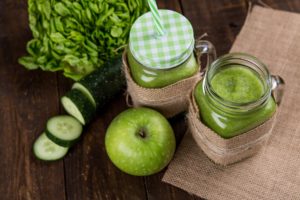Let’s start with the big question… Do you need to cleanse? From my experience, the obvious answer is Yes! The challenge for many though is not determining if they should cleanse, but rather how they should cleanse. What is safe? And for how long? These questions, along with the dreaded thought of not eating your favorite dessert, are often what keep people from doing a well-needed cleanse or detox.
Without going into all the details, there are two primary reasons why everyone needs to cleanse. First, we live in a toxic world. Our foods are contaminated with pesticides and antibiotics, our water is full of chemicals, and our air quality is less than great. Even with a perfect diet of organic, non-GMO foods, your body requires a reset. The second big reason is learned via history. Cleansing and fasting have been a ritual for thousands of years. At the root, the motivation is to get your body back to as pure as possible. Giving your body an opportunity to catch back up, especially your digestive system, has never been as important as it is now. If I were to add a third reason: You and your health are worth it!
Will it be easy? Maybe, maybe not. Do you need it? Most likely. Do you deserve it? YES!
I’ve been facilitating Whole Food Cleanses for years, and my experience tells me that everyone benefits from cleansing. This is a quick overview of how to prepare for success.
1. Prepare: Have a Plan and a Goal.
If weight loss is a primary goal, keep it realistic. If you’re doing a 10-day cleanse, don’t expect to lose 20 lbs. Usually men lose weight more rapidly than women, yet we all can get to our ideal weight when we sustain healthy eating habits. Typically, with our 21-day cleanse, men on average lose between 8-15 lbs. and women lose 5-10 lbs. Don’t get suckered into programs that claim you will lose 20 lbs. in 20 days.
Beyond weight loss, realistic health goals should include reducing inflammation, joint pain, hot flashes, and improving sleep. All are side effects of ridding your bodies of toxins and restoring health.
Have a plan beyond “I’m going to eat better.”
Know what will you eat? How often? Real food or packaged? If you’re using supplements, which is often the key to restoring your digestive and eliminative systems, be sure they are Whole Food Supplements and do not contain any stimulants or appetite suppressants.
2. Have support and accountability.
Being part of a group, having a coach, nutritionist, or your doctor is a great advantage. Have someone in your corner who can help keep you on track and accountable when things get challenging. Find someone with a good knowledge base and experience. Your surroundings are often a major influence on what you eat and drink. Ideally your spouse or close friends are cleansing with you so you aren’t tempted to stray off track.
3. Know your symptoms.
No one said cleansing toxins is easy. Symptoms are expected and should be welcomed or at least understood. Too often I hear of people bailing out of their plan because they come across some unwanted symptoms. Low energy at some point during your cleanse can be expected. By eliminating simple carbs and sugars from your diet, your body will need to re-learn how to burn fat for fuel. This can take a day or two, sometimes more. During this time, fatigue, brain fog, and even irritability can be expected. This is your key turning point in making changes! Stay the course and power through it. This is where having a good program to be part of is highly beneficial.
I find that most adults have no idea how much power sugar and chemicals have over our bodies until we give them up. Simple carbohydrates like bread, alcohol, muffins, crackers all act just like sugar and will need to be avoided in any successful cleanse.
4. Your next move.
First reflect on what you just experienced. Make note of your emotions, energy, food focuses, pain, elimination, etc.
Women who do our 21-day cleanse often eradicate their hot flashes. Some sustain this benefit with good eating habits, like avoiding sugar and processed foods, whereas others have their hot flashes return in direct relationship to poor eating and drinking.
Second, choose to eliminate one bad habit for good! Think about this from the beginning and commit to it. Your cleanse program should be the start of a healthier lifestyle that you can sustain. Moving forward, stick to a whole food clean eating plan and mark your next cleanse on your calendar.





